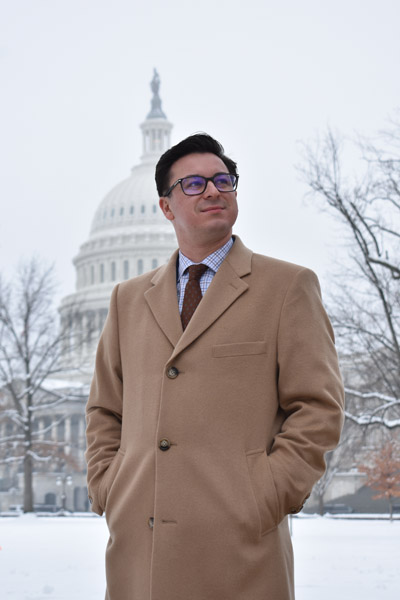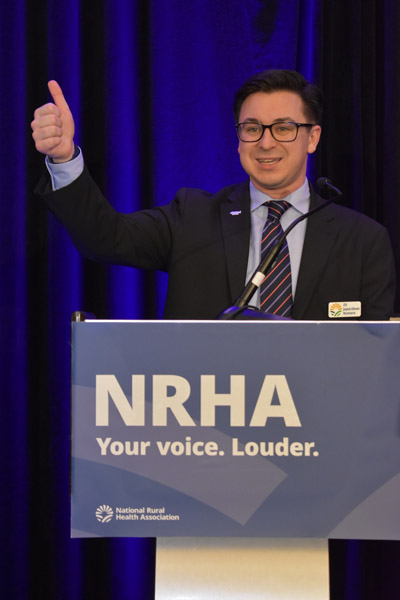NRHA's road to state rural health advocacy
It was almost National Rural Health Day, and Zil Joyce Dixon Romero’s calendar was filling up. As NRHA’s state government affairs manager, he analyzes state-level rural health trends and builds relationships with advocates to promote rural health policies. Last fall, he was tapped to speak at multiple gatherings of rural health stakeholders across the country. Faced with over half a dozen speaking requests, Joyce Dixon Romero did what anyone in his position would do: He planned a road trip.
“It was a great opportunity to meet our members where they are,” Joyce Dixon Romero says. “I find the most fulfillment in my job when I get to travel to these rural communities, meet our members, and hear about what is happening on the ground. NRHA’s Government Affairs team is doing robust work, and I was honored these associations gave us an opportunity to engage them in person. In order for us to be effective in our policymaking goals we need to be able to see it, hear it, and feel it.”
Starting in late November, Joyce Dixon Romero embarked on a 7,000-mile journey across the United States in just 10 days. The trip began with a flight to Utah, followed by a red-eye return to West Virginia. He took a quick detour back to Washington, D.C., to take an economics midterm for his master’s program before setting out to drive 1,020 miles in four days. Along the way, he spoke at in-person meetings in Virginia, Kentucky, and Mississippi, while also presenting virtually to audiences in Arizona and North Carolina.
"I find the most fulfillment in my job when I get to travel to these rural communities, meet our members, and hear about what is happening on the ground." – Zil Joyce Dixon Romero |
Primarily he spoke to state rural health association (SRHA) conference attendees about challenges and opportunities facing rural health – oral health policy, expectations for the incoming administration, workforce shortages, food insecurity, hospital closures, social drivers of health, and patient-centered care. At each stop, he met doctors and nurses, hospital administrators and advocates – and furthered his conviction that rural residents are “the best people in the world.”
 Zil Joyce Dixon Romero on Capitol Hill“Rural is a hub for innovation,” Joyce Dixon Romero says. “I feel a sense of camaraderie and community in rural places. They are doing all of the things they need to survive and thrive with limited resources, especially in the health care space, and I think that’s beautiful. But each situation is unique. Like NRHA CEO Alan Morgan always says, if you’ve been to one rural town, you’ve been to one rural town.”
Zil Joyce Dixon Romero on Capitol Hill“Rural is a hub for innovation,” Joyce Dixon Romero says. “I feel a sense of camaraderie and community in rural places. They are doing all of the things they need to survive and thrive with limited resources, especially in the health care space, and I think that’s beautiful. But each situation is unique. Like NRHA CEO Alan Morgan always says, if you’ve been to one rural town, you’ve been to one rural town.”
Joyce Dixon Romero’s efforts are all part of NRHA’s increased focus on state-level rural health policy and outreach. Having started at NRHA in 2020 as a program services coordinator focusing primarily on grant-related activities, Joyce Dixon Romero stepped into his new role in 2023 after NRHA’s Government Affairs team and senior leaders identified a need for more involvement with the nation’s 44 SRHAs.
A key part of the job is working with his Government Affairs colleagues to inform and engage established and emerging SRHAs on what’s happening in Washington. With a strong background in policy and a passion for rural health, Joyce Dixon Romero is able to help bring top-level federal conversations to the states and give SRHAs the information they need to advocate for their unique rural communities. On the flip side, Joyce Dixon Romero also listens to what’s happening on the ground in each state and elevates these concerns.
“I’m able to hear what’s happening with the SRHAs and bring that back to Washington and make those voices louder,” he says. “Our Government Affairs team elevates conversations with lawmakers and lets them know we need to find common-sense solutions, whether it’s workforce or 340B or conversations around the nursing shortage. We tell them what we’re seeing and help them find ways to solve problems.”
Joyce Dixon Romero’s personal background helps him navigate common misconceptions about rural America that he encounters, particularly the tendency to think of rural people and places as a homogenized group. Having grown up in an urban setting near Las Vegas, he has learned a lot about rural strength, innovation, and resilience during his time with NRHA. On his recent trip he met many individuals who continued to drive home the idea that rural communities need tailored solutions to overcome their distinctive health care challenges.
"NRHA has such a robust membership, and it’s incredibly valuable to be able to go to them emphasize the point that their voice is being heard. We hear them." – Zil Joyce Dixon Romero |
One of Joyce Dixon Romero’s most memorable conversations happened at the Kentucky Rural Health Association conference, where he met with a woman who had been working as a rural nurse for more than 40 years. After he spoke, he was in a hurry to get back on the road to his next destination, but she pulled him aside.
 Zil speaks at NRHA's 36th Policy Institute“She told me, ‘For the first time you have made me feel like I have a voice both in my state legislature and Washington. You made it seem so easy to understand – these complex issues drive me crazy, but you made me feel like I was seen and heard. I just wanted to say thank you,’” Joyce Dixon Romero recalls. “NRHA has such a robust membership, and it’s incredibly valuable to be able to go to them to emphasize the point that their voice is being heard. We hear them.”
Zil speaks at NRHA's 36th Policy Institute“She told me, ‘For the first time you have made me feel like I have a voice both in my state legislature and Washington. You made it seem so easy to understand – these complex issues drive me crazy, but you made me feel like I was seen and heard. I just wanted to say thank you,’” Joyce Dixon Romero recalls. “NRHA has such a robust membership, and it’s incredibly valuable to be able to go to them to emphasize the point that their voice is being heard. We hear them.”
In the coming year, Joyce Dixon Romero and NRHA’s Government Affairs team aim to continue building on their state-based approach to rural health policy. One goal involves moving from crisis response to a more proactive stance by drafting comment letters on proposed policies, getting more involved with state-level advocacy, and working with state lawmakers and regulatory agencies to protect programs like Medicaid that are essential to rural health.
NRHA has identified additional key policy issues for the current legislative session including 340B drug pricing, behavioral and mental health care, reimbursement, EMS, maternal health, oral health, RME, infrastructure, telehealth programs, and workforce.
“NRHA is focused on 10 key issue areas at the state level for this year because we are seeing emerging trends in state legislatures that are either working to cut down on public health programs or revamp and rework public health programs that are exclusionary to rural,” Joyce Dixon Romero says. “We want to make sure that doesn’t happen.”
Joyce Dixon Romero urges anyone wanting to become more involved in NRHA’s state efforts to check out the resources on the association’s advocacy website and email him at zjdromero@ruralhealth.us, as he is always eager to hear from members. As Joyce Dixon Romero’s travel schedule for the year starts to take shape, he has one more message for stakeholders: “Look for me at a conference or state house near you,” he says.
Tell your rural health story
The most impactful advocacy tool you have is your story.
Talking about your community and experiences can help those who represent us identify with rural health issues and shows the impact legislation and policy have on rural residents across the country.
You can educate decision makers, inspire other advocates to share their own experiences, and even encourage people in your community to get involved.
Let your rural story be heard through NRHA’s advocacy campaigns at RuralHealth.US/Advocacy.
